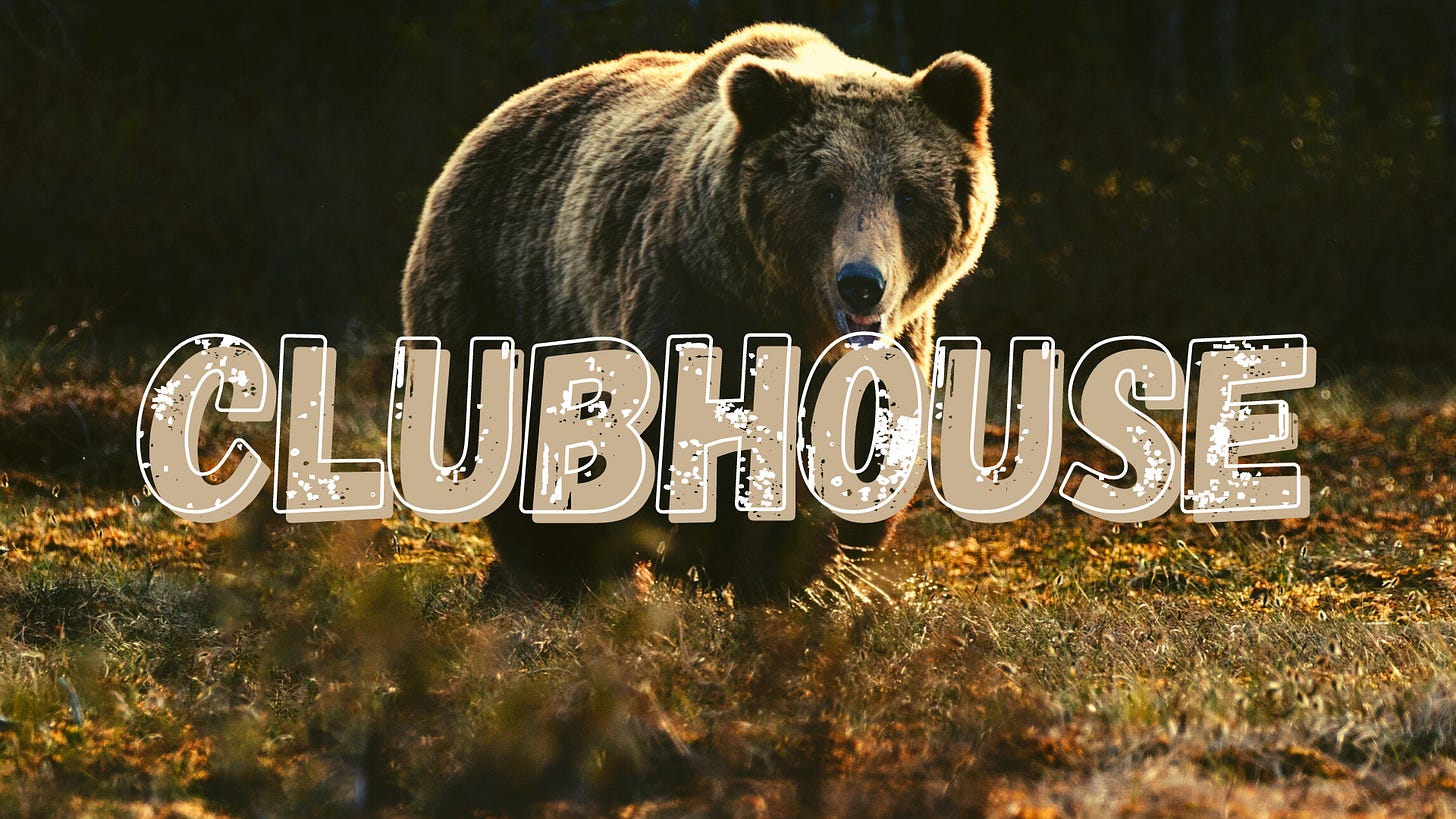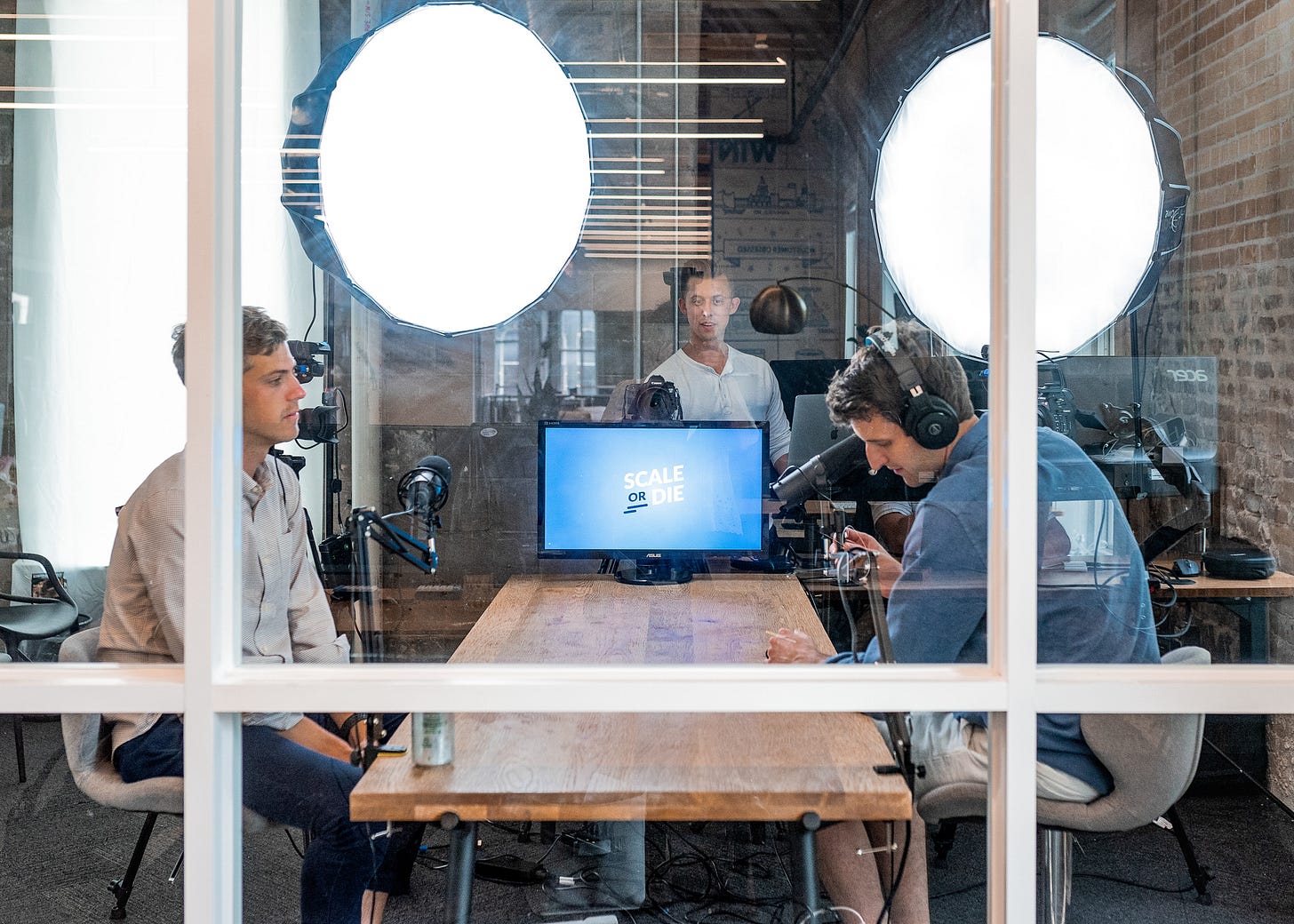Hi there!
Thanks for tuning back in to Startup Salad 🥗, my weekly newsletter where I write about startups. Today, I’m presenting the bear case for Clubhouse. (If you need an invite, DM me.) I’m also making the bull case for Capiche FM, a startup I really love.
Anyway, if you don’t want to read this, don’t worry! I’ll read it to you. (I recommend 1.5x speed!)
The Bear Case For Clubhouse
2020 was a year largely filled with anger, frustration, disappointment, sadness, and perhaps most prevalent, loneliness. As governments across the world sought to curb the impending pandemic, lockdowns became commonplace, and along with them, people became more isolated and secluded from the outside world. In many ways, it was the perfect recipe for the new audio-based social media startup, Clubhouse to make its appearance.
Clubhouse cleverly launched in April 2020 as an invite-only social media app. But Clubhouse, unlike most other social media companies, was focused on a new medium: audio. With the support of a $12 million Series A investment from legendary venture capital firm Andreesen Horowitz, it launched the social media version of a literal clubhouse.
And people loved it.
Now as Clubhouse raises its Series B round at a reported $1 BILLION valuation (yes, that’s billion with a “b”), I feel a call to present the bear case for Clubhouse. This isn’t intended to be a hit piece on Clubhouse. Betting on startups to fail, doesn’t make you smart. Clubhouse seems like a great company in many ways and I’m sure the team is full of great people. I just think that the company’s product is lackluster and that two other companies better serve the needs of Clubhouse’s users. So, here we go…
Clubhouse, in reality, seems to serve two purposes:
providing a tool enabling a 21st-century public party line, and
providing a platform for modern-day radio shows.
The problem is, Clubhouse doesn’t have the best solution for either of those purposes… Because Clubhouse is trying to serve two masters, it really serves none. Instead of building a product that does one thing really well, Clubhouse has built a product that does two things disappointingly.
The Party-Line Purpose: Twitter Spaces’ Domain
In the party-line arena, Twitter Spaces is hot on the Clubhouse’s heels. In researching this essay, I watched a demo of the product, and outside of a few bugs, I felt that it was WAY better than Clubhouse. Then I had the opportunity to use it personally and now I’m fully convinced.
Here are a few reasons why:
First of all, it’s built into an app that you already use full of people that you already follow. Instead of hopping on Clubhouse and looking for someone you know in a room, or starting a room with your friends, Twitter Spaces allows you to simply see your friends while you are already scrolling an app you use often and start a room or join theirs. The friction is greatly reduced.
The quality of the experience is also 10x better. While on Clubhouse the only way to interact with the guests is to “raise your hand,” Twitter Spaces allows listeners to more passively “react” via emoji. It’s a great way for audience members to provide feedback to the hosts, something that Clubhouse doesn’t seem to have a good solution for. Twitter Spaces also has far greater accessibility, as it will provide captioning to enable a more inclusive experience. Finally, the audio quality on Twitter Spaces is just much better. While a Clubhouse room sounds like a 1990s phone call, Twitter Spaces sounds like a 2021 podcast. And if I have a choice between high-quality audio and low quality, the choice is obvious...
Frankly, the Twitter Spaces vs. Clubhouse competition seems like another example of an incumbent copying a younger competitor’s product and prevailing due to network effects. When Twitter finally launches Twitter Spaces publicly, it will be far easier to try and far easier to use to connect with friends. To me, this is a no-brainer. Clubhouse better watch its back.
Radio Show Platform Purpose: Capiche FM 100%
When it comes to radio show platform functionality, I believe that another startup called Capiche FM is going to steal Clubhouse’s lunch. Capiche FM describes itself as:
“ a radio show + live-streamed audio + instant podcasts + real time updates from your favorite broadcasters, all in one,”
and it’s not lying. It offers its users so many features that it really operates as a full-service internet radio platform. Meanwhile, Clubhouse is not designed to host radio shows, yet many of its users are doing just that. People are routinely using it as a medium for nightly shows, but the features just don’t support that use case.
For example, Sriram Krishnan and Aarthi Ramamurthy host The Good Time Show, recapping the day in tech and culture on Sunday through Thursday evenings at 10pm PT. They have had incredible guests like Marc Andreesen, Steven Sinofsky, and Garry Tan, and they have amassed thousands of nightly listeners. I’ve tuned in and it’s honestly pretty cool to hear so many tech powerhouses in one “room.” However, Clubhouse just is not a great medium for a radio show.
The show ends up with 5-10 people on stage, trying to find space to talk, and thousands of people in the audience without any real way of interacting with the hosts. It’s like going to a conference to hear a panel from Marc Andreesen and Garry Tan and then they invite a few random friends on stage, hand everyone a microphone, and then try to conduct the panel. It’s just not effective. And it removes many of the opportunities for social cues that you find in a face to face conversation. This leads to people hogging the mic without a good way for others to signal them that they’d like to talk, beyond simply talking over them.
Advantage #1 for Capiche FM
This is where advantage #1 for Capiche FM shines through. Capiche FM recognizes a simple fact: people can only listen to one person speak at a time, so handing 12 people a microphone does not create an enjoyable audio experience. By structuring itself as a platform for radio shows, Capiche FM continues with the tried-and-true tradition of 2-3 person radio shows, instead of creating a mechanism for “in-crowd vs. out-crowd” dynamics. This leads us to advantage #2…
Advantage #2 for Capiche FM
While Capiche FM is built for radio shows, Clubhouse is built to allow the majority of its users to simply listen in on the conversations of the “in crowd.” If you’re not “on stage,” the experience can end up feeling a lot more like voyeurism than anything resembling a Clubhouse. For the majority of the app’s users, spending time on Clubhouse means listening in on the conversations of people you don’t know, many of whom are famous. While it’s not crazy that people enjoy this–who hasn’t wished they could know what “famous people” talk about–it’s created a much different user experience than any other social media app. While on Twitter you are free to interact with celebrities and strangers, Clubhouse doesn’t enable real follower → followee communication.
In fact, it almost feels like Clubhouse is trying to hinder listeners’ ability to interact with speakers. Capiche FM, on the other hand, encourages orderly audience participation. Clubhouse discourages it. To ask a question on Clubhouse you have to raise your hand and then be invited on stage. Meanwhile, Capiche FM allows listeners to participate much more easily by simply submitting a question via chat, allowing hosts to answer questions without the risk of inviting a stranger to take the mic.
This opens the door to advantage #3 for Capiche FM: trust & safety.
Advantage #3 for Capiche FM
For a speaker to interact with an audience member on Clubhouse, they have to give them a microphone. Sure, moderators can boot bad actors if they say something inappropriate, but that is a poor solution to an important problem. Clubhouse could help safely provide listeners a voice, but instead it’s created a high-risk, low-reward system that can be easily abused. Instead of enabling safe communication between listeners and speakers, Clubhouse has virtually killed it by making the barrier to entry too high. Want to play with the big dogs, okay get on stage and take the mic. Why is that step one? Why can’t that be step two or three? Why can’t Clubhouse be more thoughtful about allowing the audience to communicate with the speakers? Capiche FM so clearly wins here by doing something so simple it’s stupid: letting you submit questions via text. That’s it. On to advantage #4! →
Advantage #4 for Capiche FM
With Clubhouse, another risk arrives–the issue of enabling suspect conversations, harassment, cyberbullying, disinformation, fraud, and con-jobs. Clubhouse conversations are not “on the record.” And when online things are not “on the record,” people tend to act differently than they otherwise would.
Already, Clubhouse has created a breeding ground for many less than desirable characters. Venture capitalist and dad, Bryce Roberts, put it more clearly,
“Not until Clubhouse did I realize the sheer volume of hucksters, fraudsters and charlatans preying on aspiring founders. I’m sure it happens on all social networks, but their UX allows for random walks down the dim lit alleys of entrepreneurship in an entirely new way.”
Hop on Clubhouse at any given moment and you’ll find rooms with titles like “Millionaire No BS Business & Life Advice!!!”, “Do women really understand what being Submissive is?”, (note: can I just take a second to say, WOW...) and “‘Kama Nights’ - The (Real) Moan Room”. It’s an interesting world, and one that Clubhouse really doesn’t seem equipped to safely monitor and regulate. It’s the wild west of social media and bad actors (like Grant Cardone, Tai Lopez, and company - don’t @ me) are running rampant.
Capiche FM holds a big advantage here because every conversation can be on the record. Every conversation can be a podcast and because it is a platform for radio shows–not random jibber-jabber–you won’t end up on stage with 30-100 random people, like you can on Clubhouse.
The Verdict
Ultimately, Clubhouse just doesn’t solve its users' problems well. Will it still probably be hugely successful? Sure, but it will not be because it provided the best public party line and radio show platform. Instead, it will be because Clubhouse did an incredible job building hype.
Still, I remain hopeful that Clubhouse’s problems and Capiche FM and Twitter Spaces’ corresponding advantages will eventually become clear enough that Clubhouse users will see the light and make their way over to platforms designed to provide high-quality solutions to their problems.
🐂 The Bull Case for Capiche FM 🐂
I’m a huge fan of Capiche FM, so while I wanted to write this essay to share my views on Clubhouse, I also wanted a platform to make the case for Capiche FM.
Here we go!
As I sought to summarize my case for Capiche FM, I realized that I needed insight directly from one of Capiche FM’s users, so I reached out to Eric Knight Hornung, host of The New Faces of Finance with @ekhornung, and he explained the core of Capiche FM’s competitive advantage better than I ever could:
“Capiche takes all the best elements of the mediums that have become popular and rolls it into one easy-to-navigate product.
The no pressure, text-based hanging out of Twitch. The low-bandwidth, low-cognitive burden of AM radio. The accessibility to content creation of Anchor. The hint of creator tools like Streamlabs. And, even the spontaneous conversation abilities of Clubhouse.
Its hidden superpower? Its creators are empowered, not encumbered.
Its secret feature? Start with text, not email or apps.”
Capiche FM has the secret sauce, the world just hasn’t realized it yet. The shine of Clubhouse, while bright now, will soon fade. As rooms become a cesspool of get-rich-quick schemes and conspiracy theories, as they change from places to have conversations to places where people go to listen in on the conversations of the “in-crowd,” and, most importantly, as creators realize that Clubhouse has not provided them with the tools necessary to create a quality product, the migration will happen.
Clubhouse creators will soon realize the inefficiencies of their platform. Prolific content creators understand the wasteful nature of single-use content. Soon they will tire of spending an hour on Clubhouse sharing their learnings with 200 people, only to have to do the same thing the next night to reach 200 more people. They will realize that Clubhouse removes the leverage from content creation. They will remember why podcasts became so popular–because they could record one hour’s worth of material and share it with thousands of people for years to come.
Creators will realize that the obstacles standing in the way of truly interacting with their audience are holding them back from building anything resembling a meaningful audience. People love to interact with those that they follow, and Clubhouse doesn’t enable that in a low-risk way. Clubhouse requires creator-audience relationships to, in the words of Aubrey Graham, “go 0-100 … real quick.” And it’s just not realistic or safe.
Then, when Clubhouse users finally realize that Clubhouse has failed to provide what it promised, Capiche FM will step in to fill the gaps. It will allow creators to easily turn spontaneous conversations into podcasts, it will allow creators to smoothly interact with their fans, and most importantly...
It will empower, not encumber.
Anyway, thanks again for tuning in. I’m starting a show on Capiche FM, and would love for you to subscribe. I’ll interview people about topics related to startups and dive deeper into some of the things I write about here! I would love for you to subscribe! If you subscribe, you’ll get a text when we’re going live, so you can tune in and ask questions during the show! It’s super sweet!
If you liked this, please consider sharing it with a friend! Thanks, and take care!






